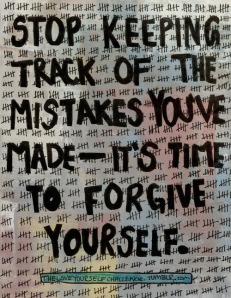The last blog I wrote talked about the importance of speaking up for yourself when someone else steps on your toes. This week, I learned a related lesson–how to apologize when you are the one who messed up.
Maybe you’re thinking, “Wait, aren’t you 23 years old? How do you not know how to apologize?” And the truth is, although I have obviously made mistakes and said “I’m sorry” before, I still have a lot of trouble owning up to things and making a direct apology. This isn’t to say that I don’t feel bad–on the contrary, I actually carry huge amounts of guilt and shame with me–but like I’ve said before, I tend to avoid people or shut down when things go wrong. Just as it’s hard for me to say, “Hey, you hurt me,” it’s also difficult to say, “Hey, I’m sorry I hurt you.” The vulnerability is too much to bear. Confrontation and I are lifelong frenemies.
Without getting too specific, this weekend I went out with some friends and ended up acting in a way that is not consistent with who I am or my values. Do you ever look at something you’ve done and think, “Who is that girl? I would never do that.” That’s kind of what this felt like.
Whenever I make a mistake, I have a tendency to internalize everything and send myself into a huge shame spiral. If you’ve ever read any of Brene Brown’s work on shame (highly highly recommended), you probably know all about this. She points out that guilt is saying, “I did something bad,” and shame is saying, “I am bad.” I never realized how steeped in shame I was until I heard this. Even the smallest mistake (like the one from this weekend), makes me feel like a monster. I still struggle with it. After this weekend, I sat down in my therapist’s office, told the story, and said, “I think I’m just a shitty person.”
“You’re not a shitty person,” she said. “You’re coming into your own. You’re still figuring out your boundaries and what your values are. It’s an ongoing process and you’re bound to make some mistakes, but that’s okay. You can apologize, learn, and grow from it. You’re a good person who did a less-than-good thing.” I realized that while I was feeling all sorts of guilt over how the other person must feel, I had forgotten to show a little compassion to myself. I know that everyone messes up and I can forgive others’ missteps, but I never afford myself the same empathy. “And furthermore,” she added, “Shitty people don’t admit their mistakes, feel guilt, or issue apologies to those they’ve hurt. The fact that you’re trying to make it right proves you’re a good person.”
And so I created a plan with her on how I would tell this friend I was sorry and learn how to check myself before I wreck myself in the future (haha). I ended up apologizing to this friend in person (turns out I had blown the whole thing out of proportion in my mind, and she wasn’t even very upset), and although it was a small step, I really felt like I grew from it. I didn’t shut down. I didn’t punish or hurt myself. I admitted my flaws and vowed to do better. And that doesn’t make me a monster–it makes me a human.
